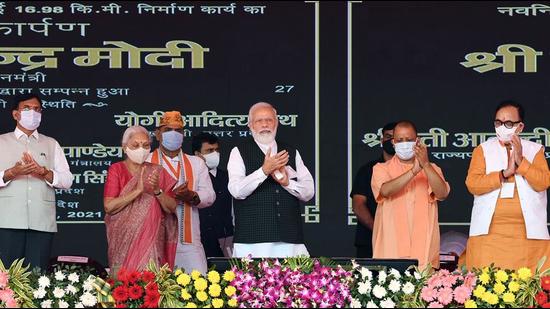WHO stands with a fairer, healthier, self-reliant, secure India for all
Increased investments in human resources for health will complement PMABHIM's focus and drive while at the same time promote additional social and economic benefits
The PM-Ayushman Bharat Health Infrastructure Mission (PMABHIM) lays out a comprehensive and systematic plan to build a fairer, healthier, more health-secure India for all. Its launch marks a historic step in India’s onward march to build health system resilience, achieve universal health coverage (UHC), and strengthen health, social and economic security.

In design and focus, PMABHIM aims to enhance capacity at all levels of India’s health system, filling gaps exposed by the Covid-19 pandemic. It comes with an additional ₹641 billion investment to strengthen national and sub-national public health systems, including core capacities of the International Health Regulations, the bedrock of national, regional and global health security.
PMABHIM’s launch comes a month after ministers of health from across the World Health Organization (WHO) South-East Asia Region committed to seize what is a once in century opportunity to build back better essential health services to achieve UHC and the health-related Sustainable Development Goals (SDGs).
In the region and globally, PMABHIM marks a bold declaration of commitment and intent. How?
First, the Mission explicitly recognises that public health is a public good that requires public action. Market forces alone cannot deliver.
Second, the Mission aims to bring health closer to communities, building on the focus and success of the National Health Mission and Ayushman Bharat, the largest global initiative to attempt to achieve UHC.
Third, the Mission breaks new ground by building regional hubs of the National Center for Disease Control (NCDC), significantly expanding the number of viral diagnostic laboratories in the country.
PMABHIM‘S plan to increase bio-security preparedness, strengthen pandemic research, and support the creation of a regional research platform for the South-East Asia Region are welcome. So too is the plan to set up nine Bio-Safety Level III Laboratories and four regional National Institutes of Virology.
The strengthening of all divisions of the NCDC is a laudable and long-awaited development. Alongside other components of PMABHIM, it will substantially boost core public health capacities required to prepare for, prevent and respond to additional waves of Covid-19, as well as other health emergencies.
Efforts to strengthen India’s Integrated Health Information Platform (IHIP) — including through an expanded information technology (IT) network — are also vital, and will increase surveillance and data flow, linking diagnostic laboratories and isolation hospitals, and enhancing local disease tracking.
The establishment of a National Institution and Platform for One Health, which will be linked to other national and international platforms, is a welcome initiative. WHO has long advocated a multi-sectoral and trans-disciplinary approach to addressing public health threats at the human-animal-ecosystem interface, including to prevent and combat anti-microbial resistance, one of the Region’s eight flagship priorities.
And while PMABHIM aims to strengthen capacity at all levels of care, including emergency care, it pays specific attention to critical infrastructure and resource needs at the primary level — where most people’s health needs should be met, and where the foundations of health system resilience are built.
PMABHIM’s focus on primary and secondary care will enhance equity in access and quality of care for India’s poor and vulnerable, promoting a social and economic recovery that is fairer, more resilient and sustainable.
Additional investments planned by PMABHIM at district and sub- district levels will complement existing primary health care interventions and strengthen decentralised health systems across the country, especially in states with relatively weak health systems – where most funds will be targeted.
In more than 600 districts, critical care hospital blocks of 50-100 beds are set to be established, enabling district level services to meet and respond to public health emergencies, while also maintaining essential health services – one of the Region’s key points of focus throughout the pandemic response.
Local-level capacities will be further strengthened by the creation of 730 high-quality laboratories at district and block levels, which will be connected to the IHIP. In the Region and across the world, the pandemic has shown how delays in diagnosis compromise early detection and treatment and can lead to widespread community transmission.
PMABHIM’s launch marks a new chapter in India’s ongoing Covid-19 response, and in its commitment to advance health equity, achieve UHC and strengthen health security. It is aligned with and reflects Region-wide efforts to grasp this historic opportunity to strengthen and transform health systems, with a focus on orienting them towards primary health care, leaving no one behind.
Increased investments in human resources for health will complement PMABHIM's focus and drive while at the same time promote additional social and economic benefits, such as poverty reduction, gender equality and decent employment. It makes a bold promise, which it is incumbent on all stakeholders to monitor and deliver, including through frequent consumer and social household surveys. WHO stands committed for a fairer, healthier, more self-reliant, and secure India for all.
Poonam Khetrapal Singh is regional director, WHO South-East Asia
The views expressed are personal
Continue reading with HT Premium Subscription




